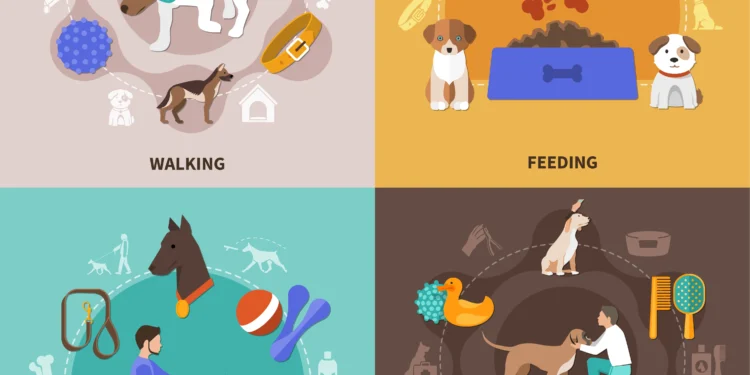The Importance of Dog Safety in the Home:
Our top priority as dog owners should be our pets’ security and welfare. Our houses serve as havens, providing us with safety and protecting household items that are harmful to dogs. Our homes should be just as comfortable for our cherished dog friends. Even in the comfortable walls of our homes, though, dangers can still exist.
Dangerous household items that can pose immediate threats to dogs
It is our duty as dog owners to make sure that our loved animals are safe and healthy. But there are some everyday objects that can immediately endanger dogs, putting them in danger of harm or even death. It is our top priority to be aware of these risks and precautions in order to protect our animal companions.
Toxic foods are one of these risks.
Certain human foods, such as chocolate, grapes, onions, and xylitol found in sugar-free gum and candy, can have detrimental effects on dogs who consume them. These medications carry a risk of serious toxicity, which can present as seizures, vomiting, diarrhea, and organ failure.
Common household chemicals represent:
Another potential danger. Dogs may become ill if they swallow cleaning products like bleach, detergents, and cleaners, which contain harmful components. Ingesting these substances can cause internal organ damage or even chemical burns to the mouth and throat.
Dogs are also seriously at risk from sharp objects.
Knives, scissors, needles, and broken glass are among the things that should be kept out of the reach of curious dogs to prevent cuts or puncture wounds from occurring from being stepped on or chewed on.
Furthermore, dogs may be at risk from wiring and cable.
Not only does chewing on these cables put them at risk for electrocution, but it also puts the entire household at risk for fire.
Hazardous materials should be carefully stored:
Out of reach or behind closed cabinets to reduce these risks and keep our furry friends safe. Securing loose wires and cords will help prevent accidents as you keep the house dog-proof.
We can make our homes safe for our four-legged relatives by monitoring expected risks inside the home and carrying out appropriate insurance. Recall that the best defense against hazardous household objects that could endanger our dogs right away is knowledge coupled with alertness.
Tips for Preventing Accidental Dog Poisoning in Your Home
It is essential to stop unintentional dog poisoning in order to protect our furry friends’ health and safety. Since dogs are inquisitive animals, it is our duty as pet owners to provide a secure environment for them. It’s possible to drastically lower the possibility of unintentional dog poisoning in our homes by adhering to a few easy guidelines. We make a list of harmful household items.
Maintaining that your dog cannot access any possible toxins is one of the most crucial precautions. This includes chemicals found in homes, such as medicines, cleaning supplies, and insecticides. Make sure they are safely kept on high shelves or cabinets that your dog cannot reach.
Being aware of common foods that can be toxic to dogs is another important piece of advice. A few examples include chocolate, grapes, onions, garlic, and some artificial sweeteners like xylitol. When preparing meals or snacks, exercise caution and make sure your dog cannot access these dangerous foods.
Additionally, you must properly dispose of any waste or hazardous materials that are in your home. It covers things like batteries, antifreeze, and even some plants that can be harmful to dogs. Make sure to properly dispose of them to prevent any possibility of inadvertent consumption.
Final thought:
It is important that you are familiar with the common signs and symptoms of dog poisoning. Learn to identify household items and recognize warning signals, including diarrhea, vomiting, excessive lethargy, fatigue, or difficulty breathing.
Taking these preventative steps and being aware of potential hazards in our homes can significantly reduce our chances of inadvertently hurting a dog. Our fuzzy friends depend on us for both protection and stability, so we should do everything in our power to keep them safe. Finding the time to educate ourselves on what to do in a crisis is not only necessary but also vital for our personal safety as well as the safety of those around us.



